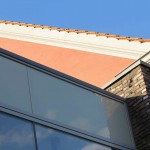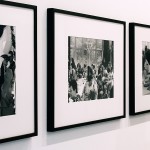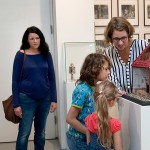
In June 1992 the Jewish Museum of Westphalia started its first activities in Dorsten, a small town located in North Rhine-Westphalia. The Museum is a private institution run by the “Association for Jewish History and Religion” (Verein für jüdische Geschichte und Religion e.V.) and the “Jewish Museum of Westphalia Foundation”. While the association is primarily responsible for the work of the museum, the foundation is concerned with funds for cultural activities and exhibits.
The Jewish Museum of Westphalia (Dorsten)
In 2001 a modern extension was built which and opened in August 2001. It is here that the permanent exhibition is now housed. Visitors can learn about Jewish history in Westphalia and the Jewish religion and they have the opportunity to experience Jewish history and culture in a regional context as well as to reflect on Jewish life in Germany in the past and present.
The permanent exhibition – completely revised in 2018 – has two main sections: “Jewish Religion and Culture” and “Jews in Westphalia”. The first part of the religion and culture section focuses on “Torah – Synagogue – Community” and the jewish festivals. Further chapters are dealing with jewish welfare, with Hebrew and Yiddish and with jewish life under the Nazi regime.
Jewish people in Westphalia from the Middle Ages to the present day are portrayed in a media section. 16stories of the men and women – merchants, teachers, artists, rabbis, politicians, footballers and others – illustrate the life of Jewish and non-Jewish Germans together in Westphalia in difficult and easier times. This part of the exhibition tells the story of how many Jewish families moved from rural areas to towns where their social status grew in importance and describes the confused times in Weimar and the terrible situation during the Nazi regime: stories of discrimination, camps, exile, liberation and a new start after 1945. The exhibition ends with testimonies of the politician Jeanette Wolff from Bocholt, the textile merchant Rolf Abrahamsohn from Marl who still plays an important role in discussion of the past as well as German-Israeli friendship and the founder of a liberal community in Unna, Alexandra Khariakova, born in Ukraine. The esection “Jews in Westphalia” not only shows the crises and catastrophes of German-Jewish history but also looks at other aspects: good relationships between Jews and gentiles benefiting everybody. The decision to display both an historical chronicle and impressions of Jewish life gives visitors the opportunity to experience different aspects of past and present.
Special exhibitions are housed in the refurbished old building of the Museum. And the library with more than 6000 books on Jewish culture and life provides interested visitors with a wealth of information. In the foyer of the museum there is a fine selection of books from the “LiteraturHandlung” book store which has large shops in Berlin, Munich and other jewish museums.








